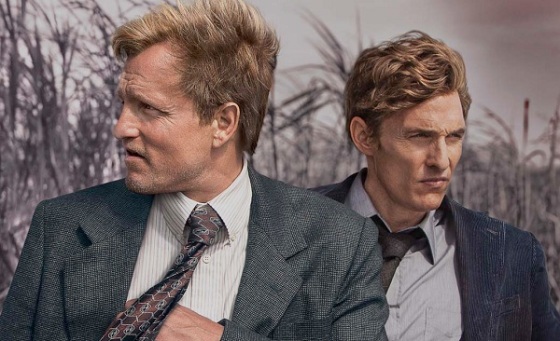
READ THIS REVIEW AT CULT FIX.
Modern television is experiencing something of a golden age at the moment, with shows like Breaking Bad, Game of Thrones, and numerous others, continuously raising the bar and our expectations with it. HBO’s latest offering, True Detective, on the evidence of its first episode (and the following four, which I have already been privy to), seems set to very comfortably join those ranks, and continue the upward trend that is being perpetuated by America’s cable networks most of all.
Novelist Nic Pizzolatto (who has just two prior screenwriting credits to his name) has been entrusted with the unenviable task of penning the entire eight-episode run, with director, Cary Fukunaga, deputed with shooting all eight of those instalments. This novelistic approach is a bold move on HBO’s part, no doubt taking their cue from shows like The Wire, but one that has proved similarly fruitful thus far.
The immutable pairing of writer and director creates a conjunctively singular, creative vision and crucial sense of continuity for the show and its characters. As opposed to episodes feeling varyingly disparate from one another due to an array of conflicting, creative input behind the scenes, each episode of True Detective feels like one part of a greater whole; like a jigsaw that’s being pieced together as we progress through the season.
This element of True Detective’s creative structure is congruous to the series’ narrative conceit of having its two main characters being interrogated by detectives Maynard Gilbough (Michael Potts) and Thomas Papania (Tory Kittles) about the events of 1995 in the present day, whilst we’re watching the unequivocal unfolding of them in tandem. The jigsaw analogy is just as applicable. The pieces of the past are being laid bare from two angles; as they actually occurred, and in retrospect. The full picture is far from being gleaned, but what it constitutes would seem to be far more than a simple “whodunit” revelation. As we’re journeying further into the mindsets and personas of our two true detectives, so too are the killer’s motives appearing a more tantalising detail to be unearthed.
True Detective is not your typical procedural affair; it’s more of an elaborate character piece on the three men at the forefront of its narrative; Rust Cohle (Matthew McConaughey), Martin Hart (Woody Harrelson), and the as yet unidentified perpetrator of the ritualistic homicide that the two detectives are confronted with at the beginning of this episode. This is why the majority of Gilbough and Papania’s questioning is focussed on the working relationship between Hart and Cohle, and their perceptions of one another. It’s a conceit that overtly delineates the characters’ respective personalities, communicating that to the audience, in a way that is also pivotal to the story being told. And it’s a requisite measure, as these two detectives have been devised as very complex individuals.
The rationalistic, philosophic musings of Rust Cohle are an antithesis to the almost archetypal American outlook of Martin Hart (he is even self-described as ‘just a regular Joe with a big-ass dick). Whilst Cohle refutes the notion of humans’ lives having any inherent significance or purpose to them beyond the natural order of birth, life, and death; debunking faiths or beliefs that attribute any further deific inherence to our existence as fanciful, Hart is conversely predisposed.
Cohle’s implicit cynicism is frequently contested by Hart, who believes that these notions generate more good than bad, irrespective of how much or how little truth there is to them (this rationale is evidenced further as the series progresses in how he absolves his own cathartic misdeeds as a necessary remedy for the distressing effects of his profession; inherently fixating on this notion that his own wrongdoings can be judged appositely if there is a perceived good that comes from them). Meanwhile, Cohle surmises that we are nothing but biological puppets or machines; spawned to serve a function that the mistaken consciousness nature imbued us with has blinded us to. Hart’s incomprehension when presented with Cohle’s postulations is seemingly feigned at times; he makes a number of sagacious observations about Cohle that suggest as much.
Both characters are fascinating templates; layered and intriguingly complex. Woody Harrelson is typically excellent and laudable as Martin Hart, but it is Rust Cohle, and equally Matthew McConaughey, who will accrue the most plaudits. McConaughey’s drawling, pensive aloofness is so captivating, as is his philosophical positing, particularly during the present day sequences. There’s a compelling contrast between the younger and older Cohle; the former, despite being of an equally impassive disposition, fails to conceal the emotions flittering across his eyes on most occasions, making him more readable and appear far more human from the audience’s perspective, whilst the latter’s are almost completely devoid of any discernible emotional output. He’s like a ghost of his former self.
True Detective is thoughtful, intelligent drama that’s occupied by a stellar cast, and directed with understated aplomb. It’s got the ball rolling with such assured excellence and scintillating promise, and I can confirm that it only gets better from hereon in. This is the first “must-watch” television of the year.
★★★★★
True Detective “The Long Bright Dark” will air on Sky Atlantic in the UK on saturday the 22nd.